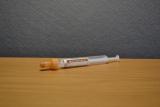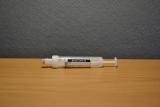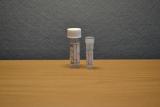Test Directory
Borrelia Serology
Containers - Adult

Brown Capped Gel Tube
|
|

White Cap
|
|
Containers - Child

White Cap - Paediatric
|
|
Reference ranges
None. Comments are put on reports by SLDTRL.
Laboratory Site
Zone 3, Raigmore Hospital
Old Perth Road
Inverness
IV2 3U
JDX6180102 - 90IV
nhshighland.microbiology@nhs.net
Transport arrangements
No Special Requirements
Sample storage arrangements
No Special Requirements
Special instructions for collection
On the rare occasions where investigation of CSF for Lyme disease is required there must be a paired serum and CSF sample taken on the same day to allow comparison of antibody levels. The sample must not be bloody. Please also send CSF for cell counts and protein and glucose. Please send at least 1 ml of CSF to Bacteriology.
How to request
Test can be orderd on TRAK or ICE or by form
Availability
Lyme antibodies are not detectable before 3 weeks post exposure and may take up to 10 weeks post exposure to develop.
Patients who present with symptoms consistent with Lyme disease (excluding recognised erythema migrans, see below) or non-specific symptoms after tick bite/exposure should be tested.
In order to avoid inappropriate testing which can lead to false positive results and poor management of patients, the following testing criteria are suggested by the Scottish Lyme Disease and Tick-borne Infections Laboratory (SLDTRL).
The following samples should NOT be tested:
1) No clinical details – results for samples with no clinical details cannot be interpreted.
2) Asymptomatic tick bite/ tick bite only – seek medical advice if become symptomatic.
3) Post treatment - monitor clinically. Serology cannot be used to assess treatment success.
4) Erythema migrans- treat empirically (as per NICE Guidelines). If there is doubt about the presentation of erythema migrans, please refer a serum sample for testing. Some clinicians are not familiar with the presentation of the rash and in these cases serology may be useful.
Anticipated turnaround
3 Weeks
What happens if the result is positive or abnormal
Patients with positive results from an NHS laboratory can be treated if uncomplicated Lyme disease. Complicated patients such as those requiring IV therapy for Lyme disease, or positive results from a non-NHS laboratory, or query chronic Lyme disease can be referred to the Regional Infectious Diseases Unit (RIDU, WGH) for advice on management.
General additional information
There is also useful guidance on the PHE website